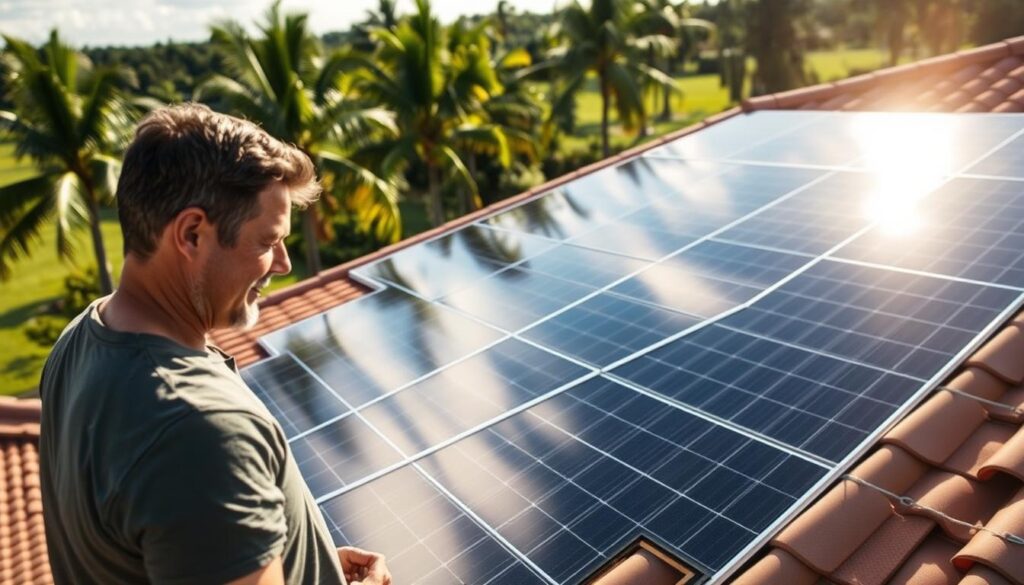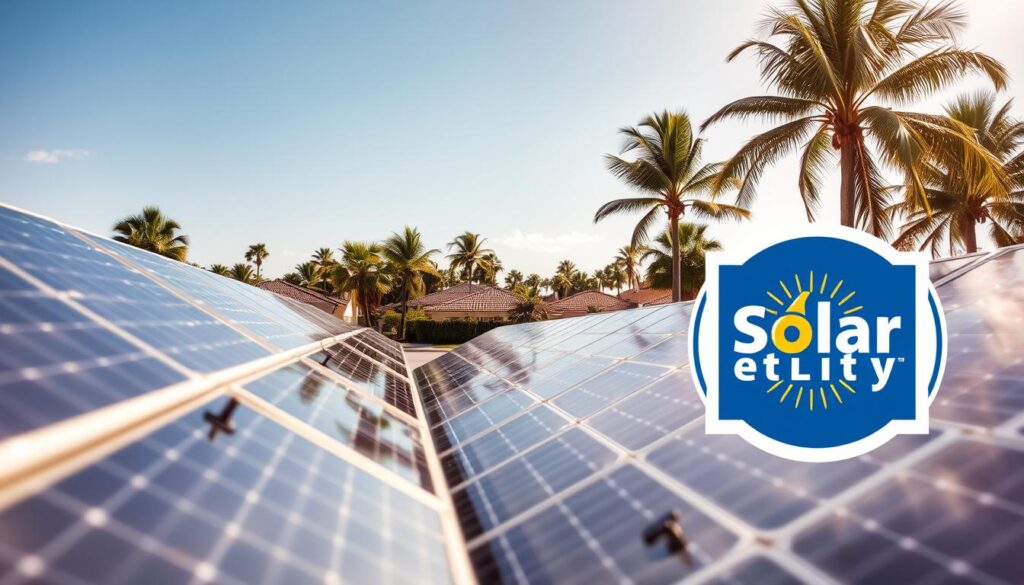Florida’s sunny climate makes it a top destination for solar energy. With over 300 days of sunshine annually, the state ranks third nationally for solar panel installations, trailing only California and Texas. Programs like the federal Solar Investment Tax Credit and state exemptions create savings opportunities. This guide shows how to use solar panels florida incentives and the Florida solar energy incentives program to cut costs and boost home equity.
Key Takeaways
- Florida ranks 3rd in U.S. solar installations, backed by year-round sunlight.
- 30% federal tax credit lowers system costs by thousands immediately.
- No property tax increases for homes adding solar systems or battery storage.
- Net metering programs give full credit for excess energy sent to the grid.
- Zillow data shows solar boosts home values by 4%, adding long-term equity.
- Systems pay for themselves in 9 years, offering 16+ years of free energy.
Introduction to Solar Incentives in Florida
Florida’s sunny climate makes it a prime location for solar energy. solar energy incentives in Florida help homeowners cut costs and boost adoption. Let’s explore how these programs work and why now is the right time to invest.
What Are Solar Incentives?
These are financial tools like tax credits, rebates, and exemptions. They lower upfront costs and encourage solar adoption. For instance, Florida’s sales tax exemption saves $1,440 on a $24,000 system.
Benefits of Going Solar in Florida
- Reduce energy bills by up to 90%.
- Boost home value by 4% instantly.
- Qualify for a 30% federal tax credit through 2032.
- Protect against rising utility rates with long-term savings.
A University of Michigan study found solar panels gain 19% in value over 25 years.
Overview of Florida’s Solar Potential
With 237 sunny days annually, Florida ranks among the top states for solar. Recent growth shows a 28% jump in installations in 2023. Major utilities like FPL and Duke Energy offer net metering, crediting excess energy at full retail rates. This combination of incentives and sunlight makes solar a smart choice.
Federal Solar Tax Credit Explained

Florida solar tax credits offer a powerful way to reduce the cost of going solar. The federal Residential Clean Energy Credit currently covers 30% of your system’s cost through 2032. This credit directly lowers your tax bill dollar for dollar. For example, a $20,000 solar system earns a $6,000 credit, cutting your taxes by that exact amount.
“The federal solar tax credit has fueled a 200% growth in the U.S. solar industry since 2000,” reports the Solar Energy Industries Association.
How the Tax Credit Works
- Covers 30% of system costs including panels, installation, and storage (≥3 kWh batteries after 2023)
- Phases down to 26% in 2033 and 22% in 2034
- No income limits or lifetime caps
Eligibility Requirements
You must own the system – leases and power purchase agreements don’t qualify. Systems must be installed by December 31, 2034 on a U.S. residence you own. Vacation homeowners can only claim the credit proportionate to their occupancy time (e.g., 25% for 3 months of annual use).
Maximizing Your Savings
Install by 2032 to lock in the full 30% rate. File Form 5695 with your taxes. If the credit exceeds your tax bill, carry over unused amounts to future years. Combine with Florida’s state sales tax exemptions for added savings.
Don’t miss out on this opportunity to slash solar costs. Plan installations strategically to maximize your Florida solar tax credits and enjoy long-term energy savings.
State-Level Incentives for Solar Installations
Florida offers unique state-level incentives for solar panels in Florida to help residents save. These programs reduce upfront costs and long-term expenses, making solar energy more accessible. Start by exploring how grants and tax breaks can lower your investment.
Florida Renewable Energy Technologies Grants
Local programs like the Solar Energy Rebate Grant Program in Dunedin reward homeowners contributing to sustainability. These grants offset installation costs, with eligibility varying by location. Check local municipalities for available rebates tied to community goals.
Property Tax Exemption for Solar Systems
- Solar equipment adds value to homes without raising property taxes.
- No tax increases even if your home’s value rises due to solar upgrades.
- Exemptions apply to panels, inverters, and mounting hardware.
Sales Tax Exemption on Solar Equipment
Since 1997, Florida has exempted solar systems from the 6% state sales tax. This saves homeowners thousands on purchases, covering: panels, inverters, and installation materials. The exemption became permanent in 2005, ensuring stability for buyers.
Utility-Specific Programs for Solar Energy
Florida’s utilities offer unique Florida solar panel rebates and incentives tailored to local needs. These programs vary by service area, so checking with your provider is key to unlocking savings.

| Utility | Program | Rebate | Requirements |
|---|---|---|---|
| Boynton Beach | Energy Edge Rebate | $1,500 | 5kW+ systems, 17.5% efficiency |
| Dunedin | Solar Grant | $0.25/Watt ($2,500 max) | Installed systems qualify |
| Florida Keys | DER Loan | Up to $35,000 | Grid-tied DER systems |
| Jacksonville JEA | Battery Rebate | $4,000 | 6kWh battery, 10-year warranty |
| Orlando OUC | Battery & Thermal | $2,000 (batteries); $900 (solar thermal) | 8kWh battery, 10-year warranty |
Battery incentives stand out: JEA’s $4,000 rebate for storage systems and OUC’s $2,000 for batteries with 8kWh capacity. Loans like Florida Keys’ $35,000 DER financing help cover upfront costs. Many programs require certified installers and meet efficiency standards. For example, Boynton Beach’s rebate demands systems at least 5kW with 17.5% efficiency.
Programs like Dunedin’s grant ($0.25 per watt) and OUC’s solar thermal $900 rebate target different needs. Check your utility’s website or DSIRE for updates, as many rebates are first-come, first-served. Combining these with Florida solar panel rebates and federal credits can cut installation costs by thousands. Always confirm eligibility with your local provider to avoid missing out.
Solar Financing Options Available
Going solar in Florida doesn’t have to break the bank. Explore these solar power incentives Florida financing options to match your budget and goals. Whether you prefer owning your system or paying as you go, these choices simplify the transition to clean energy.
Solar Loans and Leases
Own your system with solar loans. Loans let you qualify for the federal tax credit, cutting costs by 30%. For example, a $20,000 loan with 8% APR over 10 years lowers monthly bills faster. Options include:
- Secured loans: Use home equity for lower rates (6%–36%). Terms range 2–7 years.
- PACE loans: Repaid via property taxes, up to $20,000. No upfront cash needed.
- SELF loans: Florida’s state program offers 7.99%–8.25% rates for 3–10 years.
Power Purchase Agreements (PPAs)
PPAs let you pay only for energy produced. For example, a 5kW system might cost $100/month—$50 less than grid power. You avoid ownership but miss out on tax credits. Check terms like:
- No upfront costs or maintenance.
- Fixed rates protect against utility price hikes.
- PPAs save $3,731 annually compared to traditional energy.
Community Solar Programs
Join a shared array even if your roof isn’t ideal. Programs like Florida Community Solar let renters and homeowners subscribe. Benefits include:
- Subscriptions start at $50/month.
- Eligibility for state rebates like the $1,500 Boynton Beach incentive.
- No installation required—just pay for the energy you use.
How to Apply for Solar Incentives
Securing incentives for solar panels in Florida requires clear steps and organized preparation. Here’s how to simplify the process and avoid missed opportunities.

Step-by-Step Application Process
- Research federal, state, and local incentives for solar panels in Florida. Visit the Florida Solar Energy Center or your utility provider’s website for program details.
- Work with a certified installer to gather system specifications and installation dates. They’ll provide paperwork like purchase receipts and inspection certificates.
- Fill out IRS Form 5695 for the federal tax credit. Attach it to your annual tax return to claim up to 30% of system costs.
- Submit applications for state and local programs. For example, Dunedin residents must apply to the Solar Energy Rebate Grant Program by October 31st.
Document Requirements
| Document Type | Examples |
|---|---|
| Tax Forms | IRS Form 5695, W-2 forms |
| System Proof | Purchase agreements, installation permits |
| Ownership Proof | Property deed, utility bill |
| Technical Specs | System size, inverter model numbers |
Tips for a Successful Application
- Apply early for programs with limited funds, like Lakeland Electric’s battery loan program.
- Keep all receipts and correspondence in a dedicated folder. Disorganized records delay approvals.
- Use solar contractors listed on the Florida Solar Energy Industries Association (FSEIA) directory for compliance guidance.
“Double-check deadlines for rebates like Orlando’s $2,000 battery incentive. Missing dates means losing opportunities.”
Florida’s property tax exemption ensures no taxes on solar systems, but verify eligibility with local assessors. Stay proactive to unlock thousands in savings!
Impact of Net Metering on Savings
Net metering transforms solar energy into cost savings. In Florida, this system lets homeowners send unused electricity to the grid and earn credits on their bills. For instance, if your solar panels produce more than you use, excess energy flows back to the grid, reducing future bills. Here’s how it works in the Sunshine State:
What is Net Metering?
Net metering tracks energy flow between your home and the grid. When solar panels generate extra power, utilities credit you at the retail rate—the same price you pay for electricity. This credit lowers your monthly bill, maximizing renewable energy incentives Florida benefits.
Benefits of Net Metering in Florida
Major utilities like Florida Power & Light (FPL), Duke Energy, and Gulf Power offer 1:1 credits, meaning every kWh sent back earns full retail value. This can slash bills by 70–100%. Compare utility policies:
| Utility | Rate (¢/kWh) | Net Metering Type |
|---|---|---|
| FPL | 13¢ | 1:1 credit |
| Duke Energy | 14.5¢ | 1:1 credit |
| Gulf Power | 13.5¢ | 1:1 credit |
| TECO | 14¢ | 1:1 credit |
Municipal utilities like Gainesville Regional Utilities (GRU) no longer offer net metering, but most large providers still do. Credits reset yearly—unused amounts convert to cash at a reduced rate (e.g., 3¢/kWh vs. 16¢ retail).
How to Check Your Net Metering Status
Contact your utility for program details. FPL customers can visit fpl.com to review rates. Systems over 10 kW require insurance proof (up to $2M for larger setups). Plan system size to match usage patterns for maximum savings.
Factors Influencing Solar Panel Costs in Florida
Solar panel costs in Florida vary based on location, system size, and panel type. Let’s break down how these factors shape your investment and savings.
Regional price differences matter most when choosing a system. Here’s how costs compare across Florida:
- South Florida: $2.70–$3.00 per watt
- Central Florida: Slightly lower costs due to higher installer competition
- Panhandle: Higher labor costs may increase total expenses
Solar Panel Types and Their Costs
Monocrystalline panels offer 18–22% efficiency at $0.50–$0.75 more per watt than polycrystalline. Thin-film options are cheaper but less efficient. Choose based on your budget and energy needs.
Long-term Savings and ROI
Florida solar panel installation rebates and tax credits cut upfront costs. A typical 9 kW system costs $15,939 after the 30% federal tax credit. Over 25 years, homeowners save over $21,632—more than offsetting initial costs.
“Solar systems in Florida pay for themselves faster than in many states due to year-round sun,” says the Florida Solar Energy Center.
Key factors boosting ROI:
- Net metering: Sell unused energy back at full retail rate
- State rebates: Up to $2,500 in cities like Dunedin
- Energy savings: $128/month reduction in bills
With a 10-year payback period and 25+ year lifespan, solar becomes a smart investment. Use programs like JEA’s SolarSmart or OUC’s Collective Solar to maximize savings. Start comparing quotes from Florida’s 200+ installers today!
Conclusion: Start Your Solar Journey Today
Florida’s sunny climate and strong solar energy incentives in Florida make switching to solar a smart choice. With tax credits, rebates, and net metering programs, going solar saves money and boosts home value. Let’s make it easy to take that first step.
Encouragement to Explore Solar Options
Take advantage of solar energy incentives in Florida while they’re available. The 26% federal tax credit cuts installation costs, and Florida’s 230 sunny days maximize energy production. Solar panels can slash bills by 50-90%, saving up to $69,511 over 25 years. Florida’s Solar Rights Law also protects your right to install panels, even if your HOA objects. Don’t miss out on long-term savings and clean energy.
Resources for Further Information
Visit DSIRE for the latest solar energy incentives in Florida. The Florida Solar Energy Center provides technical guidance, while utilities like Florida Power & Light offer program details online. Explore PACE financing through local providers to cover up to 100% of installation costs, paided back via property taxes. Every dollar saved on energy bills boosts home equity by $20,000 for every $1,000 saved annually.
How to Find a Trusted Solar Installer in Florida
Choose licensed installers familiar with Florida’s incentives and net metering. Compare quotes from companies like SunPower or Tesla, and verify their knowledge of tax credits. Ask about warranties and payment plans. Trusted installers ensure systems last 25+ years, maximizing ROI. Start by researching certified professionals today—your future self will thank you.
